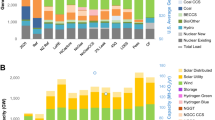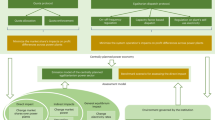Abstract
Mexico has positioned itself as a leader among emerging countries for its efforts to mitigate climate change through ambitious climate policies aimed at reducing greenhouse gas (GHG) emissions. However, the Energy Reform bill approved in 2014 promotes the production of hydrocarbons to develop the economy of this sector, as well as the use of natural gas for electricity generation in order to reduce electricity prices in the short term. In 2016, nearly 80% of Mexico’s total electricity was generated by thermal power plants. While natural gas prices stay low, there might be a limited role for natural gas to act as a fuel bridge in this sector if the government is to pursue deep decarbonisation targets to 2050. There is a risk that over-investing in gas infrastructure may delay a transition to lower carbon sources, potentially leading to less cost-efficient pathways towards decarbonisation. This analysis is based on three decarbonisation scenarios that have been modelled using an energy system optimisation model soft-linked to a power systems model. Our results suggest that a deep decarbonisation of the power system is techno-economically feasible and cost-optimal through renewables (mainly solar PV and wind); also, that decarbonisation paths post-2030 are largely dependent on the investment decisions made in the 2020s. It is therefore essential that Mexico’s energy planning decision-makers avoid a natural gas “lock-in” that would either cause carbon targets to be missed or risk leaving some natural gas infrastructure stranded.
Access this chapter
Tax calculation will be finalised at checkout
Purchases are for personal use only
Similar content being viewed by others
References
Admiraal A, den Elzen M, Forsell N, Turkovska O, Roelfsema M, van Soest H (2015) Assessing intended nationally determined contributions to the Paris climate agreement—what are the projected global and national emission levels for 2025–2030? PBL Netherlands Environmental Assessment Agency, The Hague. PBL publication number: 1879
Atlas de Zonas con Energias Limpias (AZEL). https://dgel.energia.gob.mx/AZEL/. Accessed 15 Sept 2017
Boyd R, Turner J, Ward B (2015) Intended nationally determined contributions: what are the implications for greenhouse gas emissions in 2030? Grantham Research Institute on Climate Change and the Environment, policy paper, Oct 2015
CENACE (Centro Nacional de Control de Energía) (2016) Resultados de la Segunda Subasta de Largo Plazo. https://www.gob.mx/cenace/prensa/con-precios-altamente-competitivos-se-anuncian-los-resultados-preliminares-de-subasta-de-largo-plazo-2016. Accessed 18 Sept 2017
Climate Action Tracker (2016) The ten most important short-term steps to limit warming to 1.5 °C. NewClimate Institute, Ecofys and Climate Analytics
Diario Federal de la Federación (DOF) (2012) Ley General de Cambio Climático. http://www.diputados.gob.mx/LeyesBiblio/pdf/LGCC_010616.pdf. Accessed 2 Oct 2017
Ekholm T, Lindroos TJ (2015) An Analysis of Countries’ Climate Change Mitigation Contributions Towards the Paris Agreement, VTT Technical Research Centre of Finland
Elizondo A, Pérez-Cirera V, Strapasson A, Fernández JC, Cruz-Cano D (2017) Mexico’s low carbon futures: an integrated assessment for energy planning and climate change mitigation by 2050. Futures 93:14–26
Fawcett AA, Iyer G, Clarke L, Edmonds J, Hultman N, McJeon H, Rogelj J, Schuler R, Alsalam J, Asrar G, Creason J, Jeong M, McFarland J, Mundra A, Shi W (2015) Can Paris pledges avert severe climate change? Science 350(6265):1168–1169
Federal Government of Mexico (2013a) Reforma Energética. http://cdn.reformaenergetica.gob.mx/explicacion.pdf. Accessed 4 Oct 2017
Federal Government of Mexico (2013b) National Climate Change Strategy (NCCS). 10-20-40 Vision Mexico: Federal Government of Mexico
Federal Government of Mexico (2015) Intended nationally determined contributions. Available at http://www4.unfccc.int/Submissions/INDC. Accessed 4 Oct 2017
International Energy Agency (2016) Mexico’s energy outlook. OECD/IEA, Paris, France
International Energy Agency (2017) Renewables 2017. OECD/IEA, Paris, France
IPCC (2014) Climate Change 2014: Synthesis report. Contribution of working groups I, II and III to the fifth assessment report of the Intergovernmental Panel on Climate Change. In: Core Writing Team, Pachauri RK, Meyer LA (eds). IPCC, Geneva, Switzerland
Loulou R, Remne U, Kanudia A, Lehtila A, Goldstein G (2005) Documentation for the TIMES model—part I. Energy Technology Systems Analysis Programme
Pye S, Li FGN, Price J, Fais B (2017) Achieving net-zero emissions through the reframing of UK national targets in the post-Paris agreement era. Nat Energy 2:17024
Secretaría de Energía (2016) Sistema de Información Energética (SIE). http://sie.energia.gob.mx/bdiController.do?action=temas. Accessed 3 Oct 2017
Secretaría de Energía (2017) Programa de Desarrollo del Sistema Eléctrico Nacional (PRODESEN)
SEMARNAT-INECC (2016) Mexico’s climate change mid-century strategy. Mexico City, Mexico: Ministry of Environment and Natural Resources (SEMARNAT) and National Institute of Ecology and Climate Change (INECC)
Solano-Rodriguez B (2017) Documentación del modelo TIMES MX-Regional. University College London, London, UK
Togeby M, Dupont N (2016) Renewable energy scenarios for Mexico. Ea Energy Analyses
Tovilla J, Buira D (2015) Pathways to deep decarbonization in Mexico, SDSN—IDDRI (Sustainable Development Solutions Network and Institute for Sustainable Development and International Relations)
United Nations Framework Convention on Climate Change (UNFCCC) (2015) Paris Agreement
Veysey J, Octaviano C, Calvin K, Martinez SH, Kitous A, McFarland J, van der Zwaan B (2016) Pathways to Mexico’s climate change mitigation targets: a multi-model analysis. Energy Econ 56:587–599
Author information
Authors and Affiliations
Corresponding author
Editor information
Editors and Affiliations
Rights and permissions
Copyright information
© 2018 Springer International Publishing AG, part of Springer Nature
About this chapter
Cite this chapter
Solano-Rodríguez, B., Pizarro-Alonso, A., Vaillancourt, K., Martin-del-Campo, C. (2018). Mexico’s Transition to a Net-Zero Emissions Energy System: Near Term Implications of Long Term Stringent Climate Targets. In: Giannakidis, G., Karlsson, K., Labriet, M., Gallachóir, B. (eds) Limiting Global Warming to Well Below 2 °C: Energy System Modelling and Policy Development. Lecture Notes in Energy, vol 64. Springer, Cham. https://doi.org/10.1007/978-3-319-74424-7_19
Download citation
DOI: https://doi.org/10.1007/978-3-319-74424-7_19
Published:
Publisher Name: Springer, Cham
Print ISBN: 978-3-319-74423-0
Online ISBN: 978-3-319-74424-7
eBook Packages: EnergyEnergy (R0)




